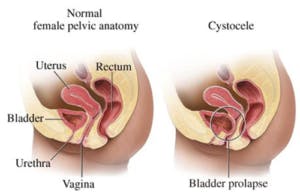Pelvic Organ Prolapse
Pelvic Organ Prolapse (POP): The Facts
Pelvic organ prolapse occurs when there is a loss of support for one or more of your pelvic organs. These include your rectum, bladder, and uterus. So what exactly is happening? To simplify, there are three ways by which our bodies support these pelvic organs, including: 1) the passive structures like fascia and ligaments, 2) the active structures like pelvic floor muscles and how strong they are, and 3) the neuromotor system or how well you use your muscles. For example, if you pushed to vaginally deliver a child, have weakness and/or atrophy in your pelvic floor muscles, or do not automatically contract your pelvic floor and deep abdominals prior to lifting, coughing, etc you are more likely to have POP. Additional risk factors include connective tissue disorders, chronic coughing, heavy or repetitive lifting, trauma during vaginal delivery, and multiple pregnancies/births. POP can be graded by your Gynecologist or Urogynecologist on a 1-4 scale (1 being minimal prolapse), and vaginal wall laxity can be assessed by your pelvic floor Physical Therapist.

What Are The Symptoms of Pelvic Organ Prolapse?
Many women report a feeling of vaginal bulging or fullness or a feeling of falling out vaginally or rectally. Often, these symptoms are aggravated by prolonged upright activity such as walking, carrying children, or exercise. Some women experience pain with intercourse and difficulty emptying their bowel or bladder. Upon inspection, one might see a bulge or protrusion at or extending from their vaginal opening.
What is the Treatment for Pelvic Organ Prolapse?
At Progress PT – Midlothian, your Physical Therapist will do a complete head to toe functional assessment that includes an in depth look at your abdominal wall and pelvic floor muscles. By doing this, we can assess your passive, active and neuromotor systems that provide support to your pelvic organs. We are looking for strong pelvic floor muscles that work with your deep abdominal muscles to support your pelvic contents throughout daily tasks such as getting out of a chair or lifting/carrying children or groceries. If we do not see these qualities, we can provide you with an initial PT program to address any dysfunction identified. If one of these three systems is not functioning fully, you can worsen your prolapse or your symptoms by performing the wrong exercises/activities or by not managing your abdominal pressure correctly. Occasionally, your PT or doctor may suggest a pessary to support your pelvic contents while you are working through your PT program. Depending upon the severity of your prolapse, a small percentage of people may need surgery after physical therapy to address remaining deficits.
Concerned about a possible prolapse? Call us today at 804-918-8515 to make an appointment for an evaluation!
